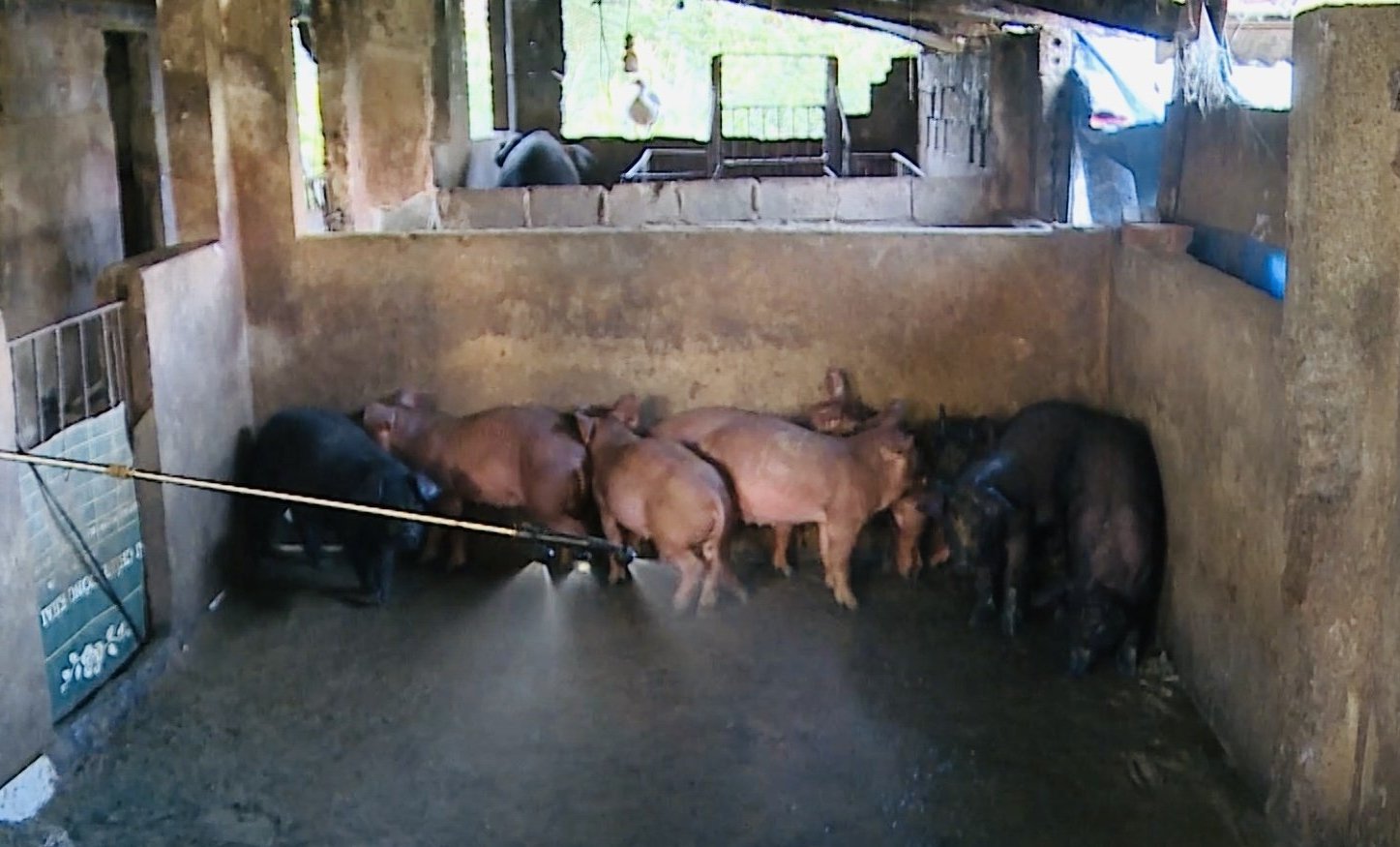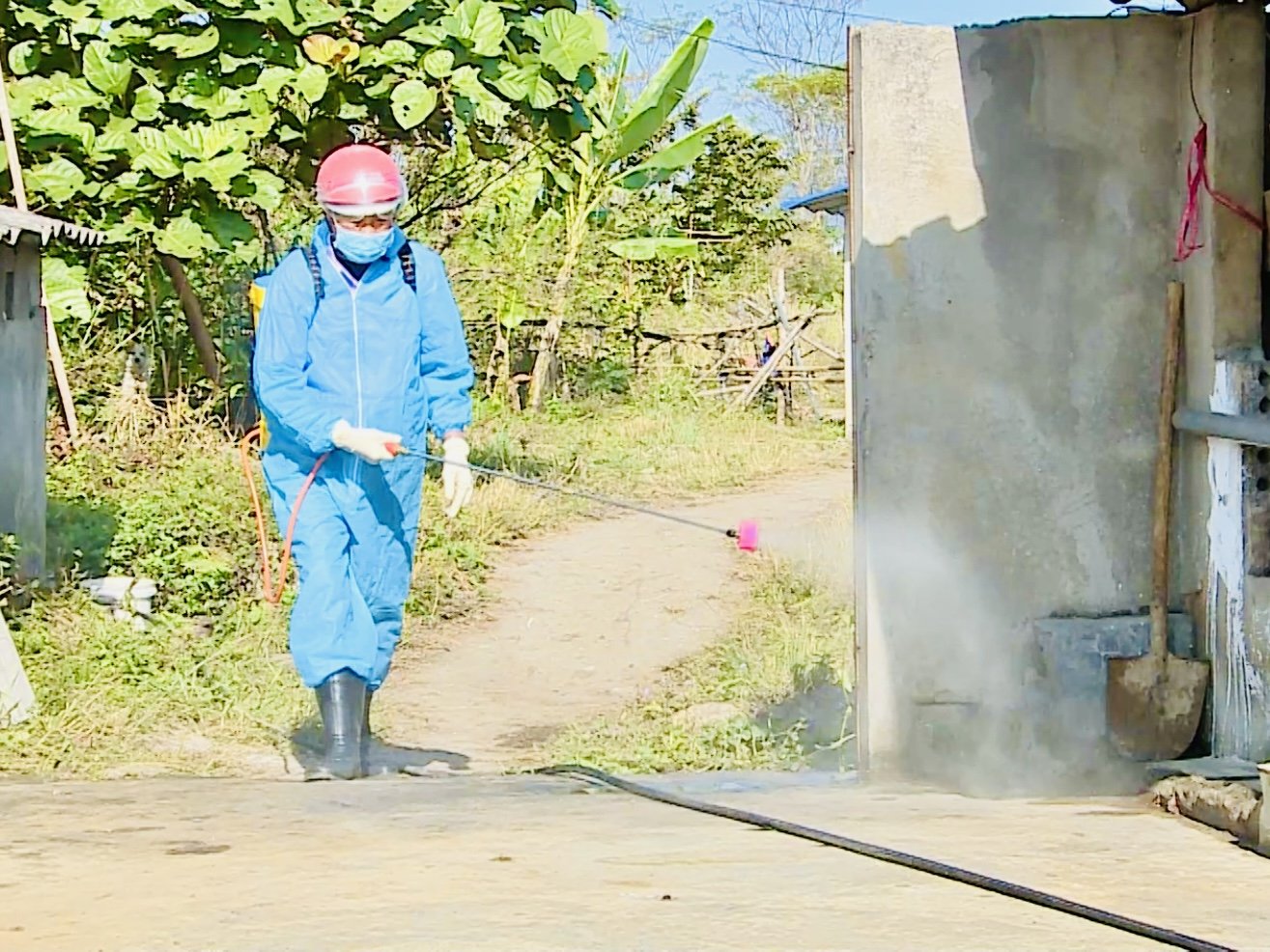December 31, 2025 | 10:46 GMT +7
December 31, 2025 | 10:46 GMT +7
Hotline: 0913.378.918
December 31, 2025 | 10:46 GMT +7
Hotline: 0913.378.918
In Tan Phong ward, Lai Chau province, in addition to residents living in the central area, many households in rural areas raise livestock, primarily pigs, to maintain their livelihoods. However, the current situation is dire.
There have been cases of pigs infected with African swine fever in the ward, and this situation is likely to develop into more complicated situations, causing difficulties for farmers. The local government and specialized agencies have, therefore, strengthened preventive measures in an attempt to stop the spread of this dangerous disease. The ultimate goal is not only to protect livestock in the area but also to contribute to limiting negative impacts on the household economy.

Cleaning and disinfecting barns to limit disease outbreaks in pigs. Photo: H.D.
Lo Thi Phong’s family in Na Bo village is one of five households found to have pigs infected with African swine fever and thus destroyed. “Early last month, a pig in the herd showed signs of lack of appetite, then died a few days later. Before that, another household raising pigs was infected with African swine fever, so I decided to immediately report it to the ward to come up with a quick response,” she said.
After receiving the information, local authorities and specialized agencies of the province took the dead pigs to destroy and isolate the area, and sprayed disinfectant on the barns, surrounding areas, and farming equipment. They also sprinkled lime powder to kill pathogens.
Meanwhile, Vang Thi Ngoc (from Na Bo village) is full of worries because African swine fever has caused economic losses of up to hundreds of millions of dong as her family had to leave the barn empty. “My family’s barn is in a secluded place with very few people passing by. The family does not even buy pork from the market, so we do not know why the pigs got infected,” said Ngoc.
Despite the difficulties, the experts have guided her family to treat the barn and perform quarantine so they can re-herd after ensuring disease safety. Experts mention that there is no specific medicine for African swine fever, but it is possible to prevent it proactively by applying biosecurity in pig farming and vaccinating the herd.
The total number of pig herds in Tan Phong ward is up to 18,000 at present, so the outbreak of African swine fever has been detrimental to households raising pigs. Since the beginning of July, African swine fever has been detected in Na Bo and Xeo Xin Chai villages, with 12 pigs dead and destroyed to this point. Therefore, Lai Chau locality has given high priority to epidemic zoning and handling in the hope of securing livelihoods for its people.
“After receiving information from the local authorities about the unusual death of pigs at a household in the area on July 11, the ward People's Committee directed specialized agencies to inspect and collect samples to send to veterinary agencies for testing,” said Hoang Thi Thanh, Vice Chairwoman of Tan Phong Ward People's Committee.

Lai Chau veterinary staff disinfect barns to prevent the spread of African swine fever. Photo: H.D.
According to the test result response form No. 4978 dated July 12, 2025, of the Central Veterinary Diagnosis and Testing Center, the sample was positive for the African swine fever virus. Along with destroying infected pigs, the local authorities temporarily provided disinfectants and chemical supplies, actively coordinated with specialized agencies and people, and isolated the affected area according to regulations.
“We propagate to people to practice the '5 no’s': No concealment of disease outbreaks; no transportation of pigs out of the epidemic area; no slaughter of infected pigs; no consumption of sick pigs; no discard of pig carcasses into the environment,” Vice Chairwoman Hoang Thi Thanh said.
Pig farming households in the ward are also instructed to comply with regulations on quarantine and veterinary hygiene, implement biosecurity solutions during the production process, and regularly disinfect and clean around barns. Up to now, African swine fever in the area has been basically under control with no new outbreaks emerging.
Information from specialized agencies shows that the recurrence of African swine fever in the area has many causes. One of the most common problems is that the pathogens from old outbreaks still exist in the environment. Some pigs are infected, but the symptoms are not clear, causing farmers to drop their guard. The lack of attention to quarantine during transportation and trading activities also increases the risk of disease spread.
Translated by Samuel Pham
/2025/12/29/0829-2-000508_274.jpg)
(VAN) Hai Phong is tightening management, with 100% of fishing vessels licensed and equipped with vessel monitoring systems, joining the national effort to lift the EC's 'yellow card.'
/2025/12/27/2744-1-121716_241.jpg)
(VAN) The Viet Nam Environment Protection Fund is the national environment protection fund and a state financial institution under the Ministry of Agriculture and Environment.
/2025/12/27/2015-2-111213_813.jpg)
(VAN) In efforts to realize the goal of Net Zero emissions, reducing urban emissions is regarded as a key solution.

(VAN) Deputy Prime Minister Tran Hong Ha requested to design the EPR mechanism toward a circular economy that is transparent, feasible, and non-administrative and aligned with actual recycling capacity.

(VAN) On December 24, Deputy Prime Minister Tran Hong Ha chaired a meeting about approving greenhouse gas emission quotas for 2025 - 2026 period.

(VAN) As Viet Nam enters a new era, the national agricultural sector must proactively adapt to global trends to transform current challenges into strategic development opportunities.
/2025/12/18/5046-3-154320_307.jpg)
(VAN) Granting planting area codes is a solution that helps Lao Cai manage forests effectively while also laying a data foundation to support the development of the carbon credit market in the future.